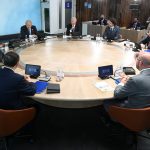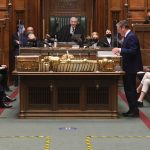The EU’s current proposals to reform the Northern Ireland Protocol “don’t go far enough”, the UK’s Brexit minister has said.
Appearing before MPs, Lord Frost said proposals from Brussels to change the protocol “do, for the first time, acknowledge they might be willing to change their own laws in order to deal with the special situation in Northern Ireland”.
But he continued: “The problem with them is that they don’t go far enough.
Please use Chrome browser for a more accessible video player
“I’m not sure they would quite deliver the kind of ambitious freeing-up of trade between Great Britain and Northern Ireland that we want to see, but what we’re trying to test is whether they could find the basis to go further than what they have put on the table.
“That’s the kind of discussions we have been having and it has been quite constructive so far, but the gaps between us remain significant, and there is a lot of working through to go.”
Lord Frost was speaking to the European Scrutiny Committee ahead of a delegation from Brussels arriving in London on Tuesday for further talks on the protocol.
The protocol is a key part of the Brexit deal struck between London and Brussels and is designed to avoid a hard border on the island of Ireland.
Brexit: Latest Northern Ireland Protocol talks ‘constructive’, says UK – as EU negotiators head for London
Brexit: Lord Frost says a ‘big gap’ remains between UK and EU over Northern Ireland Protocol
UK trade deals should prioritise economic growth over environmental protections – leaked govt document
As part of the arrangement, Northern Ireland remains under some EU rules and there are checks on goods entering Northern Ireland from Great Britain.
But having negotiated and signed up to the arrangement, the UK has now put forward proposals to change it.
The EU has responded with proposals that would cut checks on retail agri-food products arriving in Northern Ireland from Great Britain by 80%, along with a 50% reduction in customs paperwork.
Please use Chrome browser for a more accessible video player
But the role of the European Court of Justice (ECJ) in resolving disputes between the UK and the EU remains a key sticking point.
A UK government source said the arrangement “must end”, while the European Commission has insisted it will not budge on the issue.
Lord Frost made clear that the role of the ECJ is a red line for the UK, telling MPs that the government wants to make sure that the future relationship between the two sides is “not ultimately policed by EU institutions including the courts of justice”.
“What we’d like to see instead is an arbitration mechanism which is normal in these sort of treaties, it is exactly what we have in the trade and co-operation agreement (TCA),” he said.
Follow the Daily podcast on Apple Podcasts, Google Podcasts, Spotify, Spreaker
“The arrangements in the TCA are good arrangements … we worked very hard on them all last year and would be a good model in this case too.”
Lord Frost added: “It’s highly unusual in an international treaty to have disputes settled in the court of one of the parties and that is the fundamental principle that we take into this, and the fundamental thing we need to remove from the arrangements going forward.”
The minister also said he believed the bar for triggering Article 16 – designed to be used when the protocol is unexpectedly leading to serious “economic, societal or environmental difficulties” – had been met.
Please use Chrome browser for a more accessible video player
But Lord Frost said London instead wanted to work towards an agreement with Brussels.
“It would be much better for stability, prosperity and certainty for everybody in Northern Ireland if we could reach an ambitious agreement with the EU that dealt with the problem, because then we could move on and everyone would know where they stand,” he told MPs.
“I’m still focusing on that.
“As we have said, we think the test for using Article 16 is passed but we would still like to come to an agreed arrangement if we can, and that is what we are trying to do.”
And on the timeline for the talks, Lord Frost said: “We all see this as an issue for this autumn, to be settled one way or the other.”






















